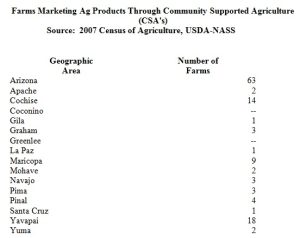With the increase in food prices, consumers everywhere are looking for ways to stretch their food dollar and get high quality, nutritious food for their families without breaking the bank. Some people have turned to coupons to make their money go farther while others look to expand their home gardening efforts. Another option is to invest in a community supported agriculture (CSA) program which provides all participants with healthy, locally grown produce many times at a lower overall cost because participants are buying straight from the farmer. Here in Arizona, participating in a CSA can provide families with a near year round source of fresh food. The demand for CSA’s is increasing. According to the latest figures from the USDA, there are over 63 CSA’s in Arizona, with the majority of them being in Yavapai County. See chart for number of CSA’s in the rest of the state.
What is a CSA?
A community supported agriculture (CSA) program is one way of bringing local farmers together with the consumers who want to purchase their products. Originally from Japan, the concept behind the CSA of today was first adopted in the U.S. at Indian Line Farm in Massachusetts in the mid 1980’s.
By creating a partnership between a farm and a group of participating members, CSAs provide benefits to both parties. The farms receive consistent funding to help with their annual operating budget and a guaranteed distribution network for their seasonal harvest. The members receive a share of the harvest and have affordable access to locally grown produce and animal products.
How does it work?
The farm sells shares to those in the community who wish to participate. Many farms sell whole and half shares by the season. Participants pay one fee to help support the farm and to aid in the purchase of seeds, water, labor, and other needs. The yield of each share depends on the success of the growing season. The farm then provides a weekly supply of fresh, locally grown produce and products to each participant for the duration of the season.
Benefits of CSA
The CSA concept offers several benefits to both the farms and the participants and benefits to the community as a whole. Farms gain a reliable market for distributing their crops and products while also receiving financial assistance early in the season to help finance operating costs. Participants have access to high quality produce and products over the course of the season for a set price which is often lower than what they would pay at a retail store.
By connecting the farmers and consumers, CSAs also help to strengthen the local economy by providing more economic stability to the farm community. Participants also help to develop and foster the existence of a locally grown food supply by offering farms an incentive to operate and sell locally.
Where to find CSAs in Arizona
In Arizona, we are blessed with the ability to grow food almost year round which means that many CSA farms offer several seasons over the course of the year. Here are some of the CSA programs available across the state.
Bountiful Baskets
Bountiful Baskets is a different kind of CSA which pulls from several local sources to provide a co-operative food buying experience for consumers. This model allows you to participate as you want to rather than buy in for a full season. For more information visit http://bountifulbaskets.org/.
Crooked Sky Farms
Crooked Sky Farms in Glendale, Arizona offers produce through their CSA program. Crooked Sky Farms also provides produce for a number of CSA’s in Arizona. For more information visit http://crookedskyfarms.com/csf/.
Desert Roots Farm
Desert Roots Farm is located in Queen Creek, Arizona and offers three seasons of produce for CSA participants. For more information visit http://www.desertrootsfarm.com/.
Love Grows Farm
Love Grows Farm is located in Mesa, Arizona. http://www.lovegrowsfarms.com
Maya’s Farm
Maya’s Farm is located in Phoenix, Arizona, and provides a variety of vegetables and fruits to the Phoenix Public Market. http://www.mayasfarm.com/csa/what_is_csa.asp
Schnepf Farms
While technically not a CSA, Schnepf Farms allows people to lease a peach tree for a year. For more information go to. http://schnepffarms.com/
Tempe CSA
With over 1600 members Tempe CSA is one of the largest in Arizona. Produce is provided by Crooked Sky Farms. http://www.tempecsa.org
The Tucson CSA offers shares of locally grown produce. For more information visit http://www.tucsoncsa.org/.
Udder Delights
Udder Delights is offered by Superstition Farms in Gilbert, Arizona and provides a dairy product CSA for local residents. For more information visit http://www.superstitionfarmtours.com/dairyclub.html.



